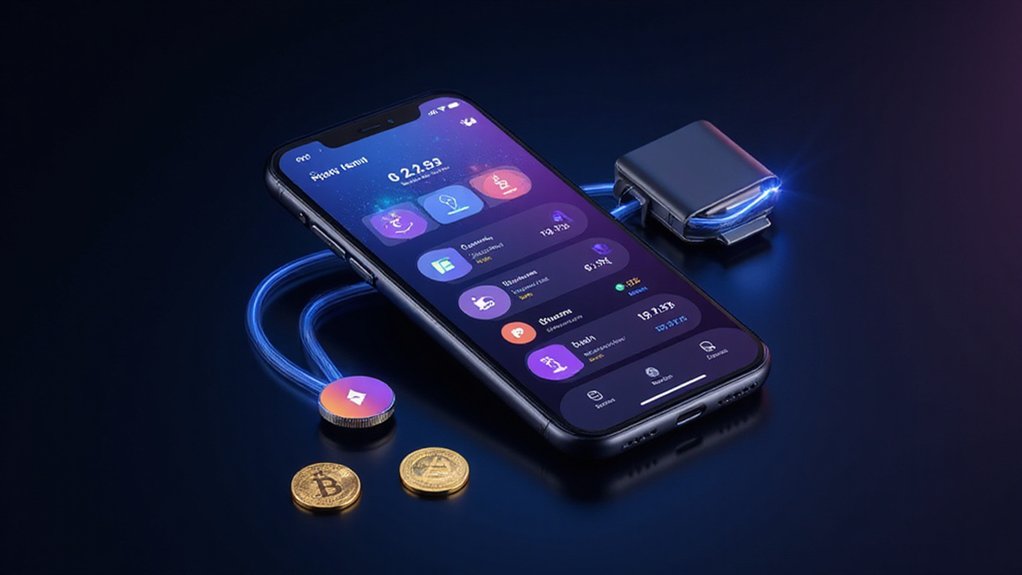Phantom Wallet has evolved from a Solana-focused platform into a sophisticated multi-chain solution supporting Ethereum, Bitcoin, Polygon, Base, and Sui networks. This non-custodial wallet combines robust security—private keys remain on users’ devices—with an intuitive interface for managing tokens, NFTs, and executing swaps. With integrated protection features flagging suspicious transactions and seamless hardware wallet compatibility, Phantom elegantly resolves the once-inevitable multi-wallet juggling act plaguing serious crypto enthusiasts. Further exploration reveals additional conveniences beyond this surface-level functionality.

The meteoric rise of multi-chain cryptocurrency usage has necessitated wallet solutions that transcend the limitations of single-blockchain architecture—a need that Phantom Wallet addresses with remarkable elegance.
Originally conceived as a Solana-native platform, Phantom has evolved into a sophisticated multi-chain solution supporting Ethereum, Bitcoin, Polygon, Base, and Sui networks, allowing users to manage diverse crypto portfolios without the labyrinthine complexity of juggling multiple applications.
As a non-custodial wallet, Phantom adheres to the foundational cryptocurrency ethos of user sovereignty; private keys remain exclusively on users’ devices, guaranteeing that individuals—not third-party entities—maintain absolute control over their digital assets.
This architecture (combined with robust encryption protocols and optional biometric authentication) creates a security framework that balances protection with accessibility, a rare achievement in the often binary security-versus-convenience paradigm that plagues financial technology.
The wallet’s interface eschews the intimidating complexity that characterizes many crypto platforms, instead offering intuitive navigation through token balances, transaction histories, and market movements.
Cross-platform functionality via browser extensions and mobile applications ensures that users maintain consistent access to their assets, regardless of device preference or location constraints.
Beyond mere storage, Phantom integrates sophisticated utility features that eliminate the need for external platforms—in-wallet token swapping, NFT management, and staking functionality transform what could be a simple key management tool into an extensive financial ecosystem.
The direct integration with decentralized exchanges like Jupiter and Raydium further streamlines the trading process, reducing friction points that typically accompany DeFi participation. Jupiter’s liquidity aggregation technology optimizes token swaps by pooling resources from various sources, ensuring users receive the best possible rates.
For security maximalists, Phantom’s compatibility with hardware wallets like Ledger provides an additional layer of protection, combining cold storage’s enhanced security with the wallet’s streamlined interface.
This hybrid approach represents an acknowledgment that different assets may warrant varying security protocols—a nuanced perspective often missing from cryptocurrency discourse.
As blockchain adoption continues its inexorable expansion, Phantom’s multi-chain wallet represents the logical evolution of digital asset management in an increasingly fragmented crypto landscape.
The wallet’s built-in swaps feature enables users to exchange tokens directly within the interface without navigating to external platforms, significantly enhancing the user experience.
Phantom’s built-in scam detection system automatically flags potentially malicious transactions and websites, providing users with crucial warnings before they might inadvertently compromise their assets.
Frequently Asked Questions
Is Phantom Wallet Secure Against Hacking Attempts?
Phantom Wallet employs robust security architecture including non-custodial key management, hardware wallet integration, and privacy proxies that collectively fortify it against typical hacking vectors.
Its proactive measures—regular audits, bug bounties up to $50,000, and phishing blocklists—demonstrate commendable vigilance.
However, no cryptocurrency wallet achieves perfect immunity; users must supplement built-in protections with prudent practices (strong passwords, vigilance against suspicious transactions) to mitigate risks inherent to digital asset management.
Browser extension vulnerabilities remain a consideration despite Phantom’s responsive patching history.
Can I Recover My Wallet if I Lose My Seed Phrase?
Unfortunately, no—losing a seed phrase is the digital equivalent of dropping your only house key into a bottomless abyss.
Unlike traditional financial systems with recovery mechanisms, cryptocurrency wallets offer no backdoor access; the immutable nature of blockchain (which provides security) simultaneously guarantees that without those specific words, one’s assets become permanently inaccessible.
Even Phantom’s support team, bound by the same cryptographic limitations, remains powerless to resurrect what the void of forgetfulness has claimed.
Does Phantom Wallet Support Tokens Besides Solana?
Yes, Phantom Wallet has evolved considerably beyond its Solana-exclusive origins.
It now supports multiple blockchains including Ethereum, Bitcoin, Polygon, Base, and recently Sui.
Users can manage native tokens (SOL, ETH, BTC, MATIC), stablecoins like USDC and USDT, wrapped tokens, and NFTs across these networks within a single interface.
The wallet facilitates cross-chain token swaps and offers fiat on-ramp services, though its multichain capabilities remain less extensive than some competitors offering support for 60+ blockchains.
What Are the Transaction Fees Compared to Other Wallets?
Phantom’s 0.1% fixed fee per transaction—a uniquely transparent cost structure—stands favorably against competitors.
While Solflare offers similar dynamic network fees without the explicit percentage, other wallets present varied economics: Exodus commands hefty 2-5% spreads, Metamask adds potential provider margins atop network costs, and Trust Wallet applies purchase premiums.
The true differentiator? Phantom’s priority fee system, which intelligently scales with network congestion rather than imposing blanket charges regardless of computational demands.
Can I Connect Phantom Wallet to Hardware Wallets?
Phantom wallet offers hardware wallet support with an emphasis on Ledger (Nano S/X) through direct USB connectivity—arguably the most seamless integration available.
SafePal users enjoy dedicated support while Keystone works through third-party channels.
Conspicuously absent is Trezor compatibility, a curious omission given its market prominence.
The setup process maintains security fundamentals: private keys remain isolated in the hardware’s secure element, with transaction signing occurring physically on the device—thus preserving that essential air-gap protection serious investors demand.









